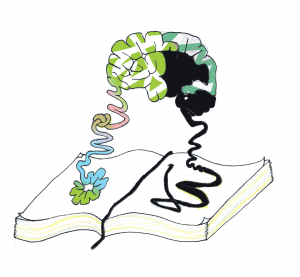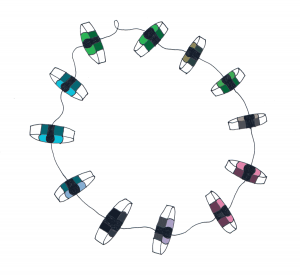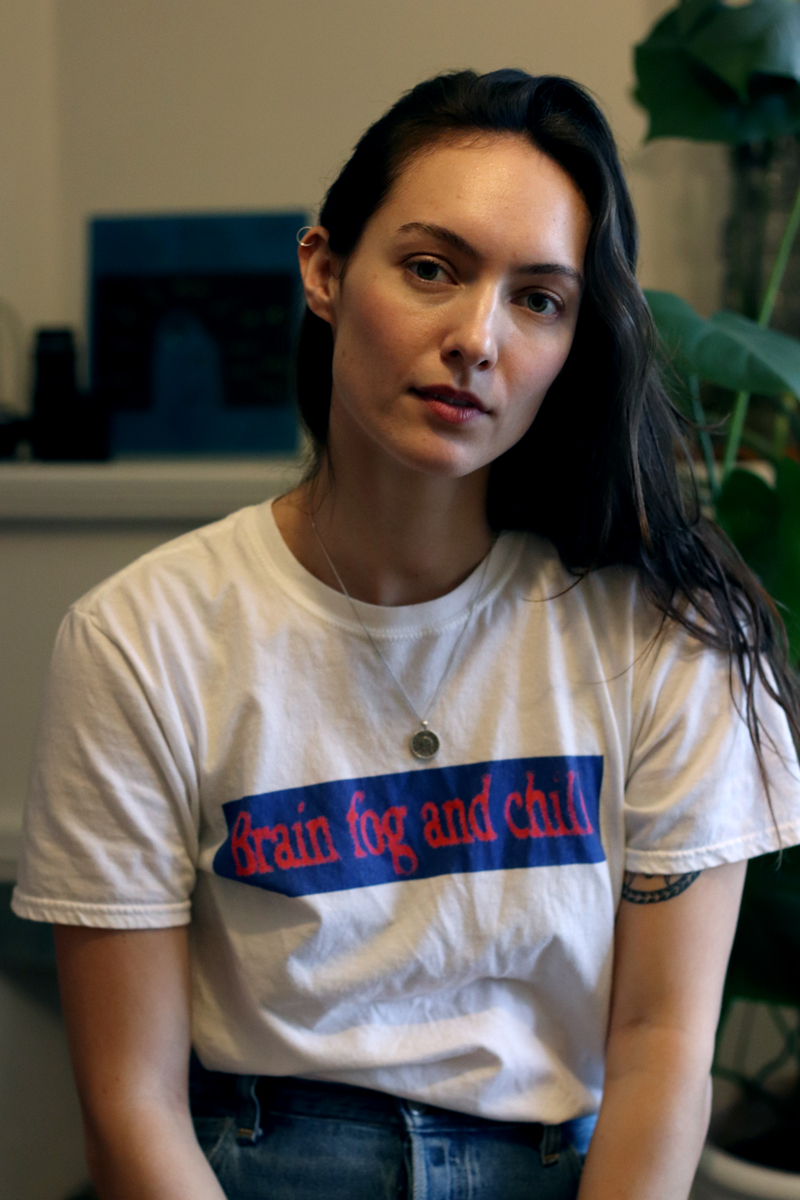I keep being wrong about Kyla Jamieson. I first saw her at a reading, where I was struck by her fierceness. Her poetry was biting and explicit, read in a deadpan, sardonic voice. One piece concluded with the lines “…I guess I like / projecting onto you / maybe it’s the closest / I’ll get to coming / on someone’s face / like a dude”. Later, in her manuscript I find a poem called “Outspoken Woman Circa 2016” which declares: “I have the worst / reputation in this room”. At that first reading, I noticed her sharp cheekbones and straight, serious eyebrows. She seemed strident and glamorous and perhaps rather vengeful, using dark humour and sharp, jerky line breaks to snap at misogyny and ableism.
But that’s only a small fragment of Kyla Jamieson. When I meet her in person, months after the reading, she is friendly and generous and giggles unexpectedly often. For someone who seems so intimidating, she’s remarkably good at vulnerability. Her Instagram is studded with effortlessly aesthetic modelling shots but between them are text posts in which she talks candidly about living with disability. “I wish healing / was a social activity” she writes in one post. In another, she laments the way that, for people living with chronic illness, “friendship can be elusive, and unpredictable, and scarce.”

Jamieson has post-concussion syndrome [PCS], something she writes about in the chapbook Kind of Animal and her forthcoming collection Body Count. While writing poetry almost always entails shining a light on intimate and private aspects of one’s life, choosing to publicly discuss one’s disability can have more drastic consequences. As Jamieson explains, “a lot of people with PCS have to be silent about their experience because of litigation reasons, or because they won’t get hired otherwise… There have been times when I’ve scrubbed my social media because I do have concerns about how that will affect my ability to survive”. Ultimately, she argues that it is the responsibility of those with privilege to take the risk of speaking up on behalf of those who are more marginalised. “I always think about how much I’m willing to risk for my voice to be a truthful one.”
At one point during the interview, she trails off mid-answer and asks me to repeat the question. “This happens,” she explains. “It’s a post-concussion thing.” Immediately I want to say that I understand, that everyone loses their train of thought sometimes, that it’s no problem, but of course, that misses the point. Post-concussion syndrome doesn’t happen to everyone, and I can’t understand, and it is a problem.

The 2019 chapbook Kind Of Animal mostly focuses PCS, but Body Count count covers a wide range of themes. There is a glimpse of a failed love story (from “I’m getting to be / so vulnerable / with you” to “…Maybe / I stopped loving you / or maybe my love / is out of the office”) and, towards the end of the collection, the emergence of a new, hopeful one. There’s also a story of healing, not just from the literal trauma of concussion, but from the wounds inflicted by misogyny, from sneering literary critiques to sexual assault.
Some poets seem to enjoy hiding the meaning of their verse beneath layers of abstraction and lyricism in a kind of poetic dance of the seven veils, but that is not Jamieson’s style. Her poems are sometimes fragmented, jumping from image to image, starting new thoughts mid-line, but she writes with a determined clarity. In Future Body Self Portrait she observes “…they’re nearly / the same thing, alive / & in pain. I’m speaking / plainly but it’s poetry.” In fact, the whole collection reads like poetry made out of plain speaking. I ask if she is afraid of being misunderstood — “I’m not so much afraid of being misunderstood,” she muses, “I’m more motivated to be understood… I do really want people to get it, and I want it to be accessible and I’m OK with that too.”
In discussions of poetry, the word “accessible” is usually a rather sneering synonym for ‘simplistic’. Many scholars have debated the notion of accessibility in poetry, but rarely in the context of ableism. We don’t usually imagine a poem being accessible in the way that a building or a bathroom can be accessible, but for Jamieson, it’s the same thing. “We can talk about accessibility through technology, through a screen reader, through audio or whatever, but some people, whether or not they realise it, make their language inaccessible for people and not just people who “aren’t as smart as them”. She emphasises the last words with heavy air quotes. “Intellectualism, and intellectual elitism, can go so unchallenged in the literary world… that’s something that I have an issue with.”
Perhaps it was this commitment to clarity over intellectualism that earned Jamieson a reputation for being outspoken as a student. She recalls being “perceived as being too feminist, or too outspoken or “a man-hater””, the reputation she celebrates in Outspoken Woman Circa 2016. In poems like that one or Review (“The critics will say / This isn’t poetry / It’s audacity”), you sense that the poet is preparing herself for a hostile reception. The tone is strident, a little defensive. But then you come to a piece like Body Count and the tone changes again, suddenly confessional and full of vulnerability: “today I went in the shower & shaved for so long my calluses fell off / I don’t like what this might be seen as saying about my politics like maybe I’m secretly as misogynistic as that man who’s in love with his sex doll as well as his sex doll side piece / but it made me feel so clean”.
Body Count is mostly written in the first person, and much of it seems to be autobiographical, complete with references to modelling and concussion and the names of real people. However, to conflate Kyla with the “I” of the poems is to get her wrong again, as she gently points out: “I don’t think that it’s possible to encapsulate the entirety of a person in language or even in one person’s idea of themselves.” I leave our interview wondering what to say about Kyla Jamieson, but of course, she is right. It’s impossible to pin a person down in words, at best you catch a few fragments. So all I can say is try it for yourselves: look for Kyla Jamieson in Body Count forthcoming with Nightwood Editions, spring 2020.


